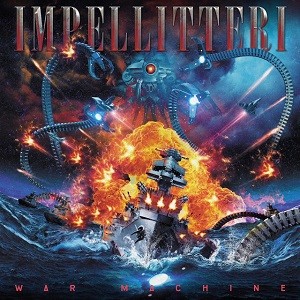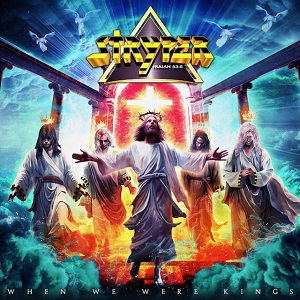TRIVIUM – “I Think You Should Rewrite This Entire Song”
November 13, 2013, 11 years ago
By Martin Popoff
If there’s a sweet spot between the oil of djent and the water of MAIDEN—something in that huge gulf—it’s the strange strain of complex modern metal that is also extremely melodic. Might TRIVIUM, now a decade into their robust rise, be the grandfathers of all this? Certainly along with KILLSWITCH and AS I LAY DYING and a bunch more, they are at the top of the pile, and that reign should purposefully continue with the band’s sixth album, Vengeance Falls, jackhammering into yer buds now via Roadrunner.
“I’d say In Waves was a more open interpretational, slightly more depressing, topically, album,” ponders guitarist and belter of a thousand voices Matt Heafy, asked to assess the personality of the new record versus their last, from two years back. “I’m not saying visually, but more so with the substance of the lyrics and what people could dig into. When it comes down to Vengeance Falls, it’s a far angrier album. It’s one that’s more direct and to the point. It’s not about multi-interpretation; it’s not about finding multi-meanings about things. Although the listener can do that. Not saying that In Waves dragged at all, but it just had so many multiple meanings going on, whereas Vengeance Falls is direct and to the point.”
Wearing the producer hat and overalls for the record was DISTURBED frontspeak David Draiman, of which Matt gives much credit to, for opening the band to new possibilities...
“Draiman was definitely the most hands-on producer we’ve had,” figures Heafy. “From being an amazing vocal coach for me... he was also instrumental in being able to dig into every single musician and really find what their key ingredient was, and how to exemplify that. With Nick (Augusto – drums), for example, he would play a straight double bass pattern, or he would go into a blast beat or something, something he typically does, not necessarily in our music, but when he’s starting off in writing. Dave would take that double bass pattern and say, ‘You know what? Pull out a section, a section of beats here, a section of beats here.’ And then the kick drum pattern, instead of being a straight machine gun blast would then turn into a polyrhythmic sort of drumming thing. And so he would really be into going into what each guy could do, in their head, and find their focal point where their main direction, their strength, their abilities.”“He would also look into the lyrics with me,” continues Matt. “If I didn’t have an entire vision together, lyrically, for a song, he would ask me, ;’What does this song mean?’ I remember the first time he asked that—because I never had a producer ask me that—I was like, ‘It’s multi-interpretational.’ And he’d go, ‘No, no, all that aside, that’s fine; what does this actually mean to you?’ So he would ask me that question, and I would then have to explain it, and if it didn’t quite make sense that every lyric line or every word didn’t entirely benefit the purpose and meaning of the song, he would then encourage me and say, ‘I think you should rewrite this section, or rewrite this section.’ So even to the point of, ‘Hey, man, I think you should rewrite this entire song.’ That kind of stuff.”
I’d say what emerges is a record that is one of the biggest vocal showcases of Trivium’s Florida-feisty career yet, no?
“David really wanted to push a couple ingredients of our band that he loved,” responds Matt. “Because he’s been a fan of the band since ‘05, so he’s been very familiar with us. One of his original things was that he did not want to change who we are. He wanted to exemplify our talents and help us deliver the best music we possibly could. A couple of the ingredients that he saw prevalent in our music that he really wanted to have a stake in, was the group that we started establishing on In Waves, a little bit on Ascendancy, and a couple of songs throughout. And melody—melody is something we’ve always had. We’ve always had this thing... I always wanted to be quote, a good singer. And it’s taken me, I don’t know, four, five records before I really felt comfortable in my singing. And nowadays, I feel more comfortable as a singer ever. And that’s something we really wanted to push. I feel like on this record, there are some songs where the singing says more aggression than the screaming can. I think that with screaming, sometimes, with people not being able to interpret it, maybe it’s being semi-difficult to understand what I’m saying, you can’t fully grasp the emotion all the time. And with screaming, it’s always that... it’s at the level of ten, it’s hitting you at ten. And with singing, there are so many different variations you can do. And with this record, it was about utilizing my entire range, whether from the very, very low stuff, like in ‘Wake (End Is Nigh)’, or the verses in ‘Strife’, or building up to the very high stuff I was doing, like the backup vocals on ‘Strife’, and having all that come through. With the vocals, there is zero autotune, zero digital manipulation. Anytime you hear a voice, it’s all real and it’s all natural.”
Flip over to the music, and Trivium seems to continue to want to be in the wheelhouse of modern metal bands in terms of technicality. Listening to this record jackhammer with such swiftness and precision, one wonders if note flurries like these are enjoyed more so as studio creations versus the live environment. No problem when it comes to the stage, says Matt, figuring the right balance has been struck.
“Luckily for us, when we went into this record, we were conscious of, aside from not thinking overly intensively on hey, we need technicality, we need to have simplicity, or this or that, we did have in our heads that we wanted these songs to really translate live and to really benefit from, whether you’re talking about a small club stage, like we played last night, or you’re talking about Wacken Open Air, where there’s 90,000 people. You want to be able to translate live. And luckily, everything on this record works also very well live. And I think we’ve learned that through having songs that maybe translate more in the club, but don’t translate well at a festival. And not to be overly nitpicky, but there are certain songs that we have that are incredibly fast, and maybe, if you’re playing at an open air stage, with 20 to 100,000 people, the people in the back won’t be able to hear it. Like the verse of ‘Declaration’ on Ascendancy, or some of the very fast trashy stuff, like on The Crusade and Ascendancy. When we did Vengeance Falls, there is fast stuff, there is technical stuff, but I feel like everything will breathe live. And I guess the ultimate test is playing a lot of these songs live. We’ve only done two of them live so far. But as we listened back on the mix, we were all were saying, between the five of us, that these songs are going to be amazing live, and they will work live. And everything will be definable live.”What about in terms of the sheer difficulty of being able to execute some of these parts?
“Oh, no, we… it will all be a piece of cake. We had to play the stuff off the Shogun record live, so I know we can do anything live. That stuff was the really hard stuff, songs like ‘Torn Between Scylla And Charybdis’. And nowadays were playing the 12-and-a-half minute song ‘Shogun’. I feel like if we could pull off songs off that record, any record is possible.”Still, it’s pointy, like the cover art.
“For me, all the lyrics and all the song titles, and all the basic semi-direction of where we wanted to go with the cover, we gave that all to our artist Brent White, and he created that,” says Matt in closing, asked about the giant Swiss army knife that is Brent’s manic metal machine. “And what that is to me is a visual metaphor, a metaphorical representation of everything that’s being said lyrically on this record. This record is a very angry record, it’s a dark record, it’s one that is calling for vengeance and retribution to fall upon those who deserve it in the world. There’s a lot of bad stuff going on in the world, and the way I’m able to deal with that all, is through creating this music. And so I feel Brent White felt that. He was able to interpret it in a way that is about vengeance falling down to earth from a different place.”










